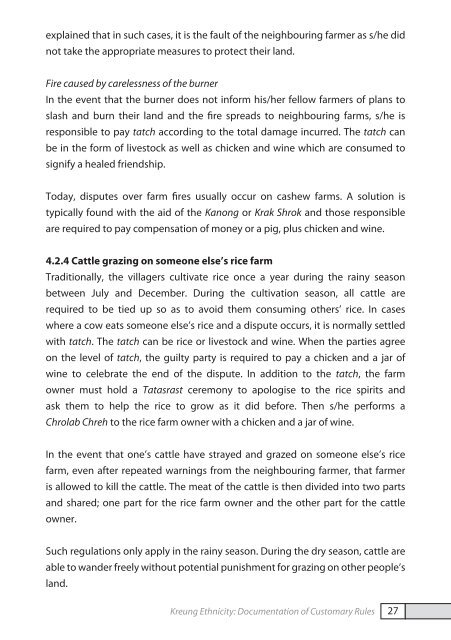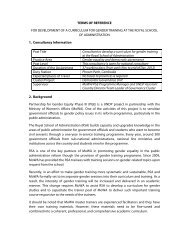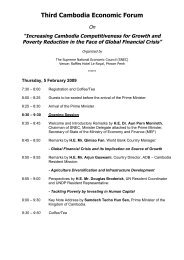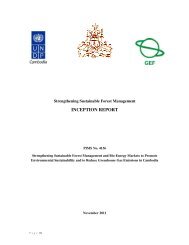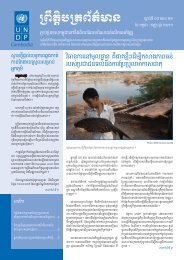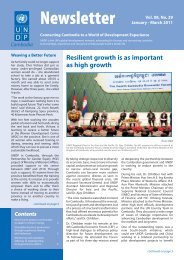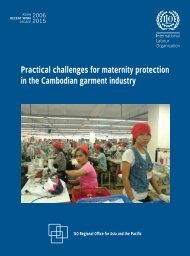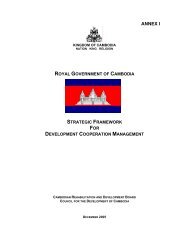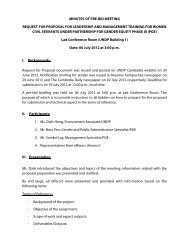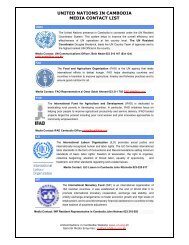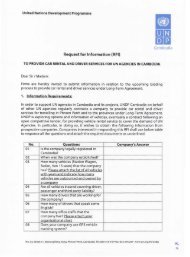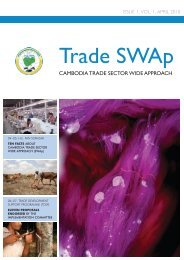Kreung Ethnicity - United Nations in Cambodia
Kreung Ethnicity - United Nations in Cambodia
Kreung Ethnicity - United Nations in Cambodia
Create successful ePaper yourself
Turn your PDF publications into a flip-book with our unique Google optimized e-Paper software.
expla<strong>in</strong>ed that <strong>in</strong> such cases, it is the fault of the neighbour<strong>in</strong>g farmer as s/he did<br />
not take the appropriate measures to protect their land.<br />
Fire caused by carelessness of the burner<br />
In the event that the burner does not <strong>in</strong>form his/her fellow farmers of plans to<br />
slash and burn their land and the fire spreads to neighbour<strong>in</strong>g farms, s/he is<br />
responsible to pay tatch accord<strong>in</strong>g to the total damage <strong>in</strong>curred. The tatch can<br />
be <strong>in</strong> the form of livestock as well as chicken and w<strong>in</strong>e which are consumed to<br />
signify a healed friendship.<br />
Today, disputes over farm fires usually occur on cashew farms. A solution is<br />
typically found with the aid of the Kanong or Krak Shrok and those responsible<br />
are required to pay compensation of money or a pig, plus chicken and w<strong>in</strong>e.<br />
4.2.4 Cattle graz<strong>in</strong>g on someone else’s rice farm<br />
Traditionally, the villagers cultivate rice once a year dur<strong>in</strong>g the ra<strong>in</strong>y season<br />
between July and December. Dur<strong>in</strong>g the cultivation season, all cattle are<br />
required to be tied up so as to avoid them consum<strong>in</strong>g others’ rice. In cases<br />
where a cow eats someone else’s rice and a dispute occurs, it is normally settled<br />
with tatch. The tatch can be rice or livestock and w<strong>in</strong>e. When the parties agree<br />
on the level of tatch, the guilty party is required to pay a chicken and a jar of<br />
w<strong>in</strong>e to celebrate the end of the dispute. In addition to the tatch, the farm<br />
owner must hold a Tatasrast ceremony to apologise to the rice spirits and<br />
ask them to help the rice to grow as it did before. Then s/he performs a<br />
Chrolab Chreh to the rice farm owner with a chicken and a jar of w<strong>in</strong>e.<br />
In the event that one’s cattle have strayed and grazed on someone else’s rice<br />
farm, even after repeated warn<strong>in</strong>gs from the neighbour<strong>in</strong>g farmer, that farmer<br />
is allowed to kill the cattle. The meat of the cattle is then divided <strong>in</strong>to two parts<br />
and shared; one part for the rice farm owner and the other part for the cattle<br />
owner.<br />
Such regulations only apply <strong>in</strong> the ra<strong>in</strong>y season. Dur<strong>in</strong>g the dry season, cattle are<br />
able to wander freely without potential punishment for graz<strong>in</strong>g on other people’s<br />
land.<br />
<strong>Kreung</strong> <strong>Ethnicity</strong>: Documentation of Customary Rules<br />
27


